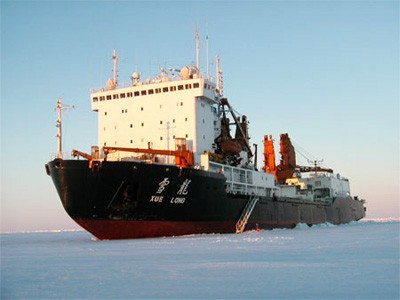Melting Sea Ice: Bad For Polar Bears, Good For China

As climate change warms the world's oceans and Arctic sea ice recedes to its lowest recorded levels this summer, China has found a way to take advantage of it, sending its first vessel through a recently opened shipping route to Iceland.
The icebreaker Xuelong, or Snow Dragon, sailed along the Northern Sea Route off Russia's Arctic coast, reaching Iceland this week.
"To our astonishment ... most part of the Northern Sea Route is open," Huigen Yang, the expedition team's leader, told Reuters, adding that China is very interested in the "monumental change" in the Arctic caused by global warming.
The expedition marks China's first successful attempt to reach the Atlantic from the Pacific via the Arctic Ocean, and highlights the country's growing interest in the region, believed to be rich in oil and natural gas reserves. Seasonal shipping lanes through the Arctic provide a shorter route to the Atlantic than the Southern Sea Route through the Indian Ocean and the Suez Canal.
Warming oceans are opening that route up to greater exploitation, and China wants to be at the forefront of the race to be a relevant player in the Arctic.
While the melting sea ice in the Arctic has presented new economic opportunities for countries like China, it is a dire warning sign of the extensive environmental impact of climate change, which the international scientific community amid overwhelming consensus has determined is caused by human activity, particularly the emission of greenhouse gases.
China is the world's largest emitter of greenhouse gases, overtaking the U.S. in 2007. With a population of over 1.3 billion, the rapidly industrializing nation is increasingly consuming more fossil fuels to meet growing demands for energy to power cars, produce food and build infrastructure.
According to scientists at the University of Colorado's National Snow and Ice Data Center and Nasa, Arctic sea ice, which reaches its lowest levels typically around September, has shrunk to an area of 1.58 million square miles, the smallest it's ever been since satellite measurements began in 1979.
The melting of Arctic sea ice has been devastating to the livelihoods of indigenous peoples in the polar region, who depend on ice for hunting seal populations that gather around it. This has similarly had a negative impact on polar bears, that also hunt seal.
The broader implications for the environment are rising sea levels that threaten small island nations and densely populated coastal regions, as well as more intense storm systems, more frequent droughts and the overall disruption of multiple ecosystems throughout the globe, all of which negatively affect global food and freshwater supplies.
There has been little consensus among global powers on how to best combat climate change. Agreements to meaningfully curb carbon emissions are merely paid lip service at global summits, while consumption of fossil fuels continues unabated and the development of renewable energy sources is consistently hindered by the politically influential lobbying of the oil and natural gas industries.
While China is making substantial investments in renewable energies, it is not willing to cut back on fossil fuels in a way that would put it at a disadvantage in the global economy.
Meanwhile, as the Arctic sea ice dwindles, there is only more temptation to explore newly accessible regions that are potential sources of oil and natural gas, the extraction and consumption of which will only further accelerate the process of global warming.
© Copyright IBTimes 2024. All rights reserved.





















